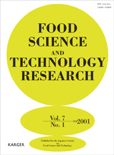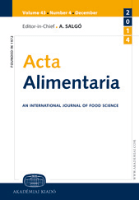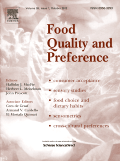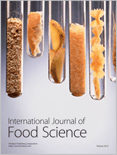
FOOD SCIENCE AND TECHNOLOGY RESEARCH
Scope & Guideline
Transforming Food Technology Through Science
Introduction
Aims and Scopes
- Food Chemistry and Biochemistry:
Research on the chemical and biochemical properties of food, including the study of food components, interactions, and reactions that affect flavor, texture, and nutritional content. - Food Safety and Microbiology:
Investigations into the microbial aspects of food products, including the detection and control of pathogens, spoilage organisms, and the application of microbiological techniques to ensure food safety. - Nutritional Science:
Studies focusing on the nutritional aspects of food, including the health benefits of various food components, dietary impacts, and the development of functional foods. - Food Processing Technologies:
Research on innovative processing methods to improve food quality, shelf-life, and safety, including thermal and non-thermal processing techniques. - Sensory Analysis and Consumer Preferences:
Examination of sensory properties of foods and how they influence consumer choices, with studies on flavors, textures, and overall acceptability. - Sustainable Food Practices:
Exploration of environmentally friendly practices in food production and processing, including waste reduction, resource management, and the use of alternative ingredients.
Trending and Emerging
- Plant-Based and Alternative Proteins:
There is a significant increase in research related to plant-based foods and alternative protein sources, driven by consumer demand for healthier and sustainable dietary options. - Functional Foods and Nutraceuticals:
Growing interest in foods that offer health benefits beyond basic nutrition, including studies on bioactive compounds and their roles in disease prevention and health promotion. - Food Nanotechnology:
Emerging research on the application of nanotechnology in food science, including the development of nanostructured materials for packaging and delivery of nutrients. - Food Waste Reduction Strategies:
An increased focus on methods to minimize food waste throughout the supply chain, reflecting a broader societal concern for sustainability and resource efficiency. - Health Impacts of Food Processing:
Research exploring the relationship between food processing techniques and their effects on health outcomes, particularly regarding the nutritional quality of processed foods.
Declining or Waning
- Traditional Food Preservation Methods:
Research on conventional techniques such as drying, salting, and fermentation has decreased, possibly due to a shift towards modern preservation techniques and technologies. - Studies on Food Additives and Preservatives:
There is a noticeable reduction in the publication of papers focused on synthetic food additives, as the industry moves towards more natural and organic alternatives. - Animal-Based Food Products:
Research centered on meat and dairy products is becoming less prevalent, reflecting a growing interest in plant-based alternatives and the impacts of animal agriculture on health and the environment. - Local and Regional Food Studies:
Papers focusing on specific local or regional food practices and products have seen a decline, suggesting a shift towards more global or universal themes in food science.
Similar Journals

ACTA ALIMENTARIA
Pioneering discoveries in agricultural and biological sciences.ACTA ALIMENTARIA is a renowned journal in the field of food science, published by AKADEMIAI KIADO ZRT, based in Hungary. Since its inception in 1973, it has served as a vital platform for disseminating high-quality research on food chemistry, microbiology, nutrition, and technology, contributing significantly to the advancement of knowledge in the agricultural and biological sciences. Currently classified in the Q3 quartile of the 2023 Food Science category, the journal is positioned to address pressing issues pertaining to food safety, quality, and sustainability, making it an invaluable resource for researchers, professionals, and students alike. Although it does not currently offer open access, the journal maintains a strong reputation with a readership keenly interested in the latest developments in food science. With a Scopus rank placing it in the 38th percentile of its category, ACTA ALIMENTARIA continues to be a pivotal reference for those engaged in food research and innovation.

FOOD TECHNOLOGY
Connecting Experts with Cutting-Edge ResearchFOOD TECHNOLOGY, published by the Institute of Food Technologists, is a pivotal journal dedicated to the advancement of knowledge and innovation in the food industry. With its ISSN 0015-6639, this esteemed publication aims to bridge the gap between food science research and practical applications, addressing ongoing challenges and technological advancements in food production, preservation, and safety. Although currently not an open-access journal, FOOD TECHNOLOGY continues to serve as a critical resource for food scientists, engineers, and industry professionals seeking to stay at the forefront of emerging trends and research in the field. Recognized for its impact within the academic community, it holds a Q4 ranking in Chemistry, Food Science, and Industrial and Manufacturing Engineering categories, reflecting its importance in disseminating valuable information. Researchers and practitioners alike will find in its pages a wealth of insights that can influence practices and policies in food technology. The journal's editorial team, committed to upholding rigorous standards, ensures that each issue is a thorough representation of high-quality research and a valuable addition to the body of food science literature.

Food Quality and Preference
Enhancing Insights into Consumer Behavior and Food QualityFood Quality and Preference is a leading journal in the fields of food science and nutrition, published by ELSEVIER SCI LTD. With a notable impact factor and ranking in the Q1 quartile for both food science and nutrition and dietetics in 2023, this journal consistently publishes high-quality research that explores the multifaceted aspects of food preferences, sensory evaluation, and consumer behavior. The journal provides a critical platform for researchers, professionals, and students engaged in the study of food quality, aiming to enhance our understanding of how sensory properties, nutritional value, and consumer choices intersect. Its commitment to disseminating cutting-edge findings makes it an essential resource for advancing the field and informing practice in both academic and industry settings. Access to the journal is via subscription, allowing for robust engagement with pioneering research that shapes current and future practices in food-related studies.

Food Chemistry-X
Connecting Researchers to the Future of Food Science.Food Chemistry-X is a premier open-access journal published by Elsevier, dedicated to advancing the field of food chemistry through high-quality research and comprehensive reviews. With its ISSN of 2590-1575, the journal has gained significant attention since adopting an open-access model in 2019, allowing wide dissemination of knowledge and innovations in food science. Based in the United Kingdom, it holds prestigious Q1 rankings in both Analytical Chemistry and Food Science categories as of 2023, positioning itself as a leading platform for researchers worldwide. The journal's focus spans extensive topics within food chemistry, including food safety, nutritional analysis, and the chemical properties of food, offering insights that are crucial for addressing contemporary challenges in food production and consumption. With a Scopus rank placing it in the 65th percentile among the top journals in Food Science and the 58th percentile in Analytical Chemistry, Food Chemistry-X is an essential resource for academics, professionals, and students seeking to stay at the forefront of research and innovation in this vibrant field.

JOURNAL OF FOOD SCIENCE AND TECHNOLOGY-MYSORE
Pioneering Research for a Sustainable Food FutureJOURNAL OF FOOD SCIENCE AND TECHNOLOGY-MYSORE, published by SPRINGER INDIA, is a distinguished peer-reviewed journal that has been contributing to the ever-evolving field of food science since its inception in 1974. With an ISSN of 0022-1155 and E-ISSN 0975-8402, this journal holds a commendable position in the Q2 category for Food Science, as per the 2023 metrics, and ranks #58 out of 389 in Scopus's Agricultural and Biological Sciences sector, achieving an impressive 85th percentile. The journal publishes high-quality research articles, reviews, and case studies that cover a wide array of topics, from food preservation to innovative technologies in food processing. Although it is not an open-access journal, it endeavors to disseminate essential knowledge and research strategies that advance food science and benefit both industry professionals and academia. The geographical reach of the journal, alongside its rigorous editorial standards, solidifies its stature as a pivotal resource for researchers, professionals, and students dedicated to the enhancement of food science practices and technologies.

Food and Bioprocess Technology
Connecting Researchers to Shape the Bioprocessing LandscapeFood and Bioprocess Technology, an esteemed journal published by Springer, serves as a premier platform for disseminating cutting-edge research in the realms of food science, industrial manufacturing engineering, and process chemistry and technology. Established in 2008, the journal has quickly ascended to the prestigious Q1 quartile in multiple categories, highlighting its impact and relevance within the scientific community. With an impressive Scopus ranking that places it in the top tiers of its fields—such as rank #17 in Safety, Risk, Reliability, and Quality, and rank #38 in Food Science—this journal is pivotal for researchers and professionals aiming to publish innovative findings that advance food processing and bioprocess technology. Beyond its rigorous peer-review process, the journal facilitates access to high-quality, impactful research, reinforcing its significant role in shaping the future of biotechnological applications in food systems. Aimed at both scholars and practitioners, Food and Bioprocess Technology is an essential resource for those engaged in exploring sustainable practices and enhancing food quality and safety. Furthermore, by addressing essential topics in the field, it fosters collaboration and knowledge exchange among researchers dedicated to advancing the bioprocessing landscape.

Current Research in Food Science
Advancing Knowledge in Food ScienceCurrent Research in Food Science is a leading peer-reviewed academic journal published by Elsevier, specializing in the dynamic field of food science. Since its transition to an Open Access model in 2019, the journal has broadened its reach, contributing significantly to the dissemination of high-quality research. With strong rankings, including a Q1 quartile status in Applied Microbiology and Biotechnology, Biotechnology, and Food Science, it stands out as a pivotal resource for scholars. Based in the Netherlands, current research published within its pages spans a wide range of relevant topics, ensuring that researchers and practitioners stay abreast of the latest advancements. The journal's impressive Scopus rankings enhance its credibility, with a percentile standing in the 74th to 83rd range across relevant categories, underscoring its impact and importance in the academic community. Current Research in Food Science aims to foster the exchange of innovative ideas and foster collaborative efforts among researchers, making it an essential resource for those engaged in advancing the science and technology of food.

Acta Scientiarum Polonorum-Technologia Alimentaria
Exploring the Future of Food TechnologyActa Scientiarum Polonorum-Technologia Alimentaria, published by Poznan University of Life Sciences, is a revered journal in the field of food science, showcasing cutting-edge research and innovations in food technology. Established as a leading platform within its domain, this journal is indexed under Scopus and ranks in the 2023 Q3 quartile for Food Science, demonstrating its commitment to high-quality scholarship. With an ISSN of 1644-0730 and E-ISSN 1898-9594, it serves as a critical resource for researchers, professionals, and students seeking to stay at the forefront of advancements in food safety, quality control, and sustainable practices. The journal has also been recognized for its contributions to the agricultural and biological sciences, positioning itself at rank #205 out of 389 in this competitive field. While currently not offering open access, the journal's valuable insights and findings, especially as it publishes through 2024, play a crucial role in advancing knowledge and fostering collaboration among experts in the food science sector.

FOOD SCIENCE AND BIOTECHNOLOGY
Innovative Insights for a Healthier TomorrowFOOD SCIENCE AND BIOTECHNOLOGY, published by the Korean Society of Food Science & Technology (KOSFOST), stands as a prominent peer-reviewed journal dedicated to advancing knowledge in the fields of food science, biotechnology, and applied microbiology. With ISSN 1226-7708 and E-ISSN 2092-6456, this journal serves as a pivotal platform for disseminating high-impact research from South Korea and beyond, reflecting a robust Q2 ranking in multiple categories including Applied Microbiology and Biotechnology, Biotechnology, and Food Science as of 2023. The journal's influence is further emphasized by its positions in various Scopus ranks, where it showcases a commendable percentile ranking in Agricultural and Biological Sciences and Biochemistry. Although access options remain limited, the journal’s objectives revolve around the publication of innovative research, fostering interdisciplinary collaboration, and facilitating the exchange of ideas among a diverse community of researchers, professionals, and students. Whether you are involved in food technology, microbial biotechnology, or nutritional sciences, FOOD SCIENCE AND BIOTECHNOLOGY are instrumental in shaping the future of these critical fields, propelling advancements that enrich our understanding of food systems and health.

International Journal of Food Science
Fostering Collaboration in Food Science ResearchThe International Journal of Food Science, published by HINDAWI LTD, stands as a crucial platform for advancing knowledge within the realm of food science. Established in 2013, this Open Access journal based in Egypt has garnered significant recognition, achieving an impressive Q2 classification in the 2023 Food Science category, which reflects its commitment to quality and impactful research. With a Scopus rank of #88 out of 389 in Agricultural and Biological Sciences and placing in the 77th percentile, this journal serves as an essential resource for researchers, professionals, and students dedicated to innovative developments and scientific exploration in food science. The journal not only provides unrestricted access to valuable research but also aims to foster collaboration and dissemination of knowledge on critical issues affecting food safety, nutrition, and technology. For those looking to keep abreast of the latest advancements, the International Journal of Food Science is certainly an indispensable addition to their academic pursuits.